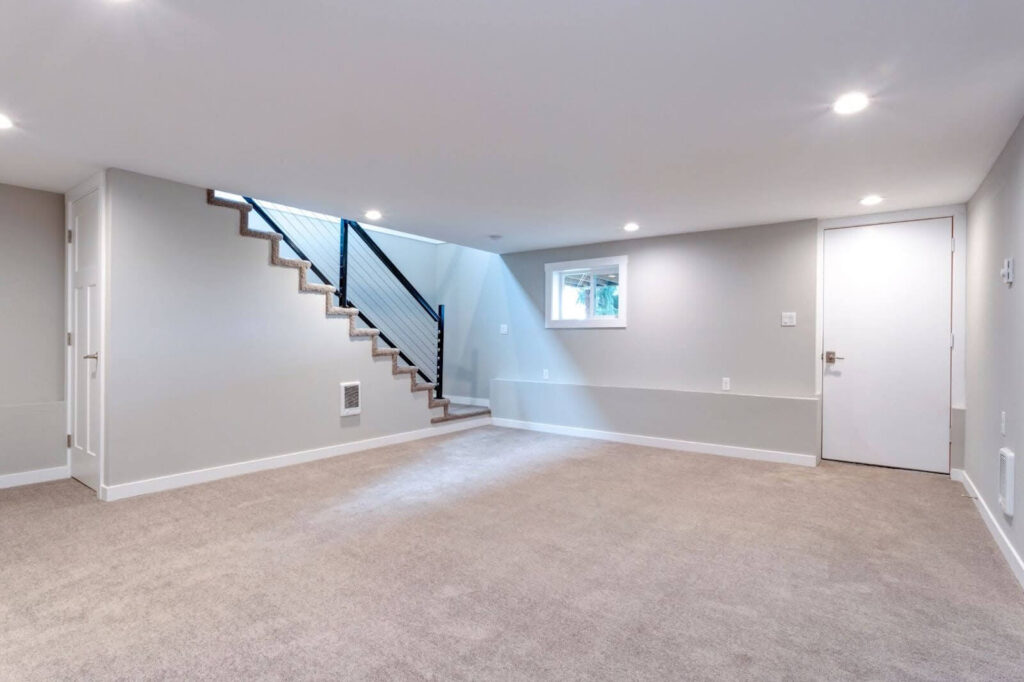Carpeting is a great way to make a room in your home warmer and cozier. No area of the home needs cozy comfort more than a basement, but what carpeting works in Nashville basements?
The Primary Challenge of Basement Carpeting
The primary issue homeowners face when selecting flooring for below-grade spaces is moisture. Whether it’s humidity, leaks, cracks in the concrete slab, or flooding, water tends to find its way into our basements. This makes basement carpeting a particularly difficult proposition, but nothing is impossible.
The sources of moisture in a basement are usually easy to spot. You may notice wet spots in the basement if you’ve lived in a home for a while. Sometimes, they have an easy explanation: a leak in the foundation during heavy rain or a drip from a plumbing issue in the ceiling. Other times, the source of moisture is harder to determine. Is there a crack in the concrete that’s letting moisture seep up? Even without a leak, humidity can accumulate in the absorbent fibers of your carpet, causing mold and mildew to form. Determining the cause of the moisture in your basement and dealing with it before your carpet installation can save you time and money, as well as the headache this type of damage can bring with it.
Controlling Moisture
There are many methods for waterproofing a basement, and they have very different costs depending on the issue you’re facing. Sometimes, all it takes is a dehumidifier to get your basement dry enough for carpet. Humidity in the area should be between 50% and 60%. Installing dehumidifiers is a relatively affordable way to control moisture in a basement, but make sure humidity is your only moisture worry before installing basement carpet.
Waterproofing services are expensive, but they can give you the peace of mind you need to add carpeting to your finished basement. Invest in a good sump pump for your basement and ensure it has a battery backup in the event of a power outage caused by severe weather. Ultimately, any basement, no matter how wet it is, can be controlled. There is a cost to it, so it’s important to determine whether adding this livable space to your home is worth the work and money.
Moisture-Resistant Options
So what is the best carpet for a moist basement? Low-pile carpeting made from artificial materials is the best for basements. The less dense your carpet is, the less moisture it will retain from the humidity or a leak/flood. Carpets that are thin dry much quicker, whereas carpets with a lot of padding take a long time to dry. Many carpets can survive a flood; the primary concern is mold and mildew development if it doesn’t dry quickly.
Some carpeting has a waterproof backing that can keep moisture from rising from the concrete floor underneath, making these varieties a great option for basements. Carpets that are sectioned work well in a basement because of how easy they are to replace. Carpet tiles are a great, cost-effective way to add carpeting to your basement. They can be applied to concrete easily using adhesives, and many are now peel and stick, making installation even simpler. Removing damaged tiles is easy and cheap; simply store some extra tiles elsewhere until you need them. The best carpet for basements is likely carpet tile for this simple reason. Replacing wall-to-wall carpeting is much more expensive, even if only a part of the carpet is damaged by moisture.
Get the Right Carpeting for Your Basement
Your basement can support carpeting, even if you currently have a moisture problem. If you want your carpeting installed in the correct way to control moisture, contact Nashville’s carpeting pros at Ozburn-Hessey for a consultation and estimate today.

